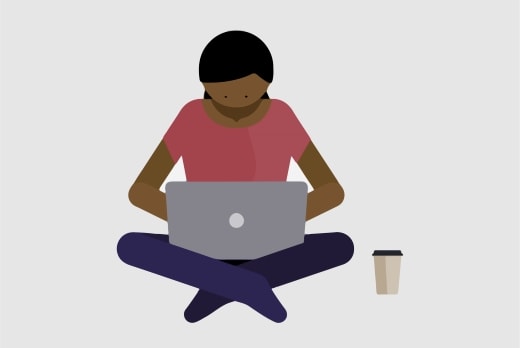Updated: May 23, 2023
Interviewing may be a new experience for many recent college graduates. However, just like you'd study for a test or prepare for a presentation at school, you can learn how to ace an interview.
Lesley Mitler, the founder of a career coaching company that focuses on college students and recent graduates, says one of the big mistakes that some recent graduates make is they prepare for certain common questions, but they don't plan for the entire interview process. Yes, you'll want to be ready to answer common questions. But you also want to be prepared to share your experiences or skills, ask questions of your own, and send a thank you note afterwards.
Ready to get started? Here are seven tips for interviewing you can use during your hunt for a new job.
1. Practice answering common questions
"First, I recommend researching some of the more common interview questions you can expect to be asked," says Ali Stewart, a former career coach.
You can find lists of common questions online. They often include questions like:
- Why are you interested in this job?
- What's your biggest strength?
- What's your biggest weakness?
In addition to some common questions about yourself, Stewart says many of the questions asked during interviews for entry-level positions are open-ended behavioral or situational questions. She shares one example, "tell me about a goal you reached and how you achieved it?" Add a few of these types of questions to your list, and then it's time to practice, practice, practice.
"You don't want to sound like a robot during the interview," Stewart says, "but practicing answering the questions repeatedly will help you retrieve the information quickly, especially if you are feeling nervous."
2. Prepare stories and use the STAR method
One of Stewart's interview tips is to draw on experiences you had during school and extracurricular activities when you're answering questions. However, if you're able to use a workplace example, perhaps from an internship or summer job, that could make for a stronger answer.
Both Stewart and Judith Panagakos, a master career coach and mentor, recommend using the STAR technique to answer behavioral questions. STAR stands for situation, task, action, and results, and here's how it works:
- Situation. Set the scene by describing the situation so that the interviewer understands the context. Try to be as specific as possible, but don't use any jargon or acronyms that the interviewer might not understand.
- Task. Explain the problem you were facing or your specific responsibilities in the scenario. Maybe you had to organize a group, overcome a setback, or make a major decision with limited information.
- Action. Describe the steps you took to resolve the problem or complete the task. Make sure to include why you made that decision. How did you conclude that this was the best option?
- Result. Share the results and impact of your actions and whether you achieved your goal. (Hint—you get to pick the situation, so choose one that had good results.) You can also share the most important things you learned from the experience.
One of Panagakos's interviewing tips is to highlight your unique contributions during your STAR stories. For example, if you use a group project as the situation, make sure you focus on your role in the group and how you directly impacted the result.
3. Practice interviewing with others
While practicing answering interview questions on your own is a good way to start, getting feedback from someone else is even better.
"I would reach out to your college's career center and schedule a mock interview session with one of the center team members," Stewart says. "Even though you have already graduated, you may still have access to the resources provided by career services."
You could also ask friends or family members to help you practice interviewing. Or, if you want professional experience, you could hire a career counselor who can share more tips for interviewing and help you hone your responses.
4. Be ready for a variety of requests
While you might be able to predict a few of the questions, you shouldn't be surprised if the interview involves questions or exercises you didn't expect.
"A candidate might be asked to do a case study, take an assessment, meet with a group of other candidates, or sit with a panel," Mitler says. "Don't be caught off guard; imagine a variety of scenarios before you go, so that you are confident and ready for a dynamic, unexpected situation."
You can ask the recruiter or hiring manager how you should prepare, but some companies might want to keep part of the process a secret. However, other candidates sometimes share their experiences on Glassdoor, including the questions they had to answer and the exercises they had to do.
5. Create a company fact sheet
Another one of Mitler's interview tips is to learn from your experience but still approach each interview with the same enthusiasm as your first. "Recent graduates who have been on the interview circuit make a huge mistake if they do not actively prepare for every interview with fresh eyes," Mitler says.
While your interview skills will improve over time, you should still research the company and interviewers before each interview.
You can look on the company's website for bios and use LinkedIn® to find out more about the interviewers. Then, research the company on its own site and news sites.
"The research work should culminate in a fact sheet, so that the quick facts regarding the firm's history, product lines, major locations, and competitors are all in one place," Mitler says. You could think of it like making flash cards or a study sheet that you would use to prepare for final exams.
6. Be ready to ask questions
"Plan to finish strong by asking well-crafted questions and end the meeting by expressly stating interest in the opportunity," Panagakos says.
Some generic questions might apply to many different interviews, such as what type of training you'll receive and what a day in the role will be like. However, you can also ask questions about something that came up during the interview and about the business based on the current events you learned about when creating your fact sheet.
One of Panagakos's tips for interviewing is to "be sure to ask the interviewer about their own experiences in the organization."
7. Thank the interviewers
The final part of the process takes place after you leave the interview—sending a thank you note.
"I am often asked about sending emails versus handwritten thank you notes, and either is fine," Stewart says.
What's most important is the message. You want to thank the interviewers for their time, restate your excitement for the job, and tell them you're looking forward to moving forward in the hiring process.
You can also use the thank you note to clarify an answer you stumbled over during the interview, or share a link that the interviewer might find interesting if you bonded over something in particular during the interview.
"And don't forget to thank the recruiter or HR representative," says Stewart, who was a recruiter for years and only received a few thank you notes. It could be an excellent way to set yourself apart from other applicants.
LinkedIn® is a registered trademark of LinkedIn Corporation and its affiliates in the United States and/or other countries.





